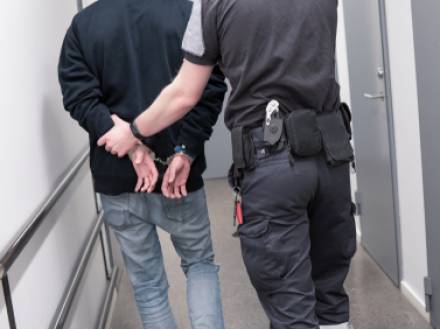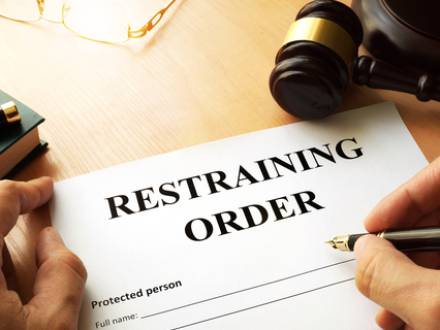Recent Blog Posts
Is it a Crime to Provide False Information Online? | CT
 The internet provides many people with anonymity. It is easy to use fake names and other false identifying information when interacting with others, and people may hide their identities or pretend to be someone else for a variety of reasons. However, as people and organizations continue to focus on privacy and security, some may be concerned about the legal implications of lying about their identities. Could providing false identifying information or making other false statements lead to criminal charges?
The internet provides many people with anonymity. It is easy to use fake names and other false identifying information when interacting with others, and people may hide their identities or pretend to be someone else for a variety of reasons. However, as people and organizations continue to focus on privacy and security, some may be concerned about the legal implications of lying about their identities. Could providing false identifying information or making other false statements lead to criminal charges?
As digital technology becomes more widely used, there are a variety of legal concerns that people may face in relation to their online activities and interactions. Those who may face accusations that they have violated the law can work with an attorney to determine the best ways to address these issues. A skilled lawyer can provide guidance on the rights that apply to people who use the internet, the situations where criminal charges may apply, and the best options for defense against these charges.
Connecticut Experiences Increases in Alcohol Use and DUI Rates
 Over the past several years, the rates of substance use and abuse have increased throughout the United States. Connecticut, in particular, has seen a striking increase in the number of alcohol-related deaths. Many of these cases involve driving under the influence (DUI), and because of the risks of fatal car accidents, people who are arrested for drunk driving are likely to face serious penalties.
Over the past several years, the rates of substance use and abuse have increased throughout the United States. Connecticut, in particular, has seen a striking increase in the number of alcohol-related deaths. Many of these cases involve driving under the influence (DUI), and because of the risks of fatal car accidents, people who are arrested for drunk driving are likely to face serious penalties.
Understanding the best ways to defend against DUI charges is not always easy, and people in these situations will need to take steps to avoid a conviction whenever possible, reduce the potential penalties they may face, and regain their driving privileges after a license suspension or revocation. A skilled attorney can provide the guidance and legal representation needed to resolve these cases successfully.
Increases in Substance Use
Drug addiction and overdoses have been an ongoing concern in Connecticut and the United States. However, in recent years, alcohol use has become another serious issue. Studies have found that Connecticut stands out in dangerous alcohol use. Between 2012 and 2022, the rate of alcohol-related deaths in the state increased by 166 percent, which is a larger increase than in any other state. While alcohol consumption is prevalent among both adults and minors, around 20 percent of adults engage in binge drinking, which can be especially dangerous.
Can "Second Look" Laws Allow Prisoners to Be Released Early?
 The United States incarcerates more people than any other developed country. Many prisoners face lengthy sentences, including life in prison in many cases. As the prison population throughout the country ages, the costs of keeping people in prison are increasing. Many states are looking to address this issue by passing laws that allow for sentences to be reviewed and potentially reduced.
The United States incarcerates more people than any other developed country. Many prisoners face lengthy sentences, including life in prison in many cases. As the prison population throughout the country ages, the costs of keeping people in prison are increasing. Many states are looking to address this issue by passing laws that allow for sentences to be reviewed and potentially reduced.
Prisoners may be able to pursue relief under these "second look" laws. However, there are a variety of legal factors that may play a role in these cases, and it is crucial to work with a criminal defense attorney who can help protect a person’s rights and advocate for solutions that will allow them to achieve success after being released.
The Benefits of "Second Look" Laws
State lawmakers have begun to address concerns about aging prisoners, the costs of incarceration, and the measures that may be taken to protect public safety. They have proposed or passed legislation that may allow courts to review sentences and determine whether prisoners may be released early.
DNA Tests Allow for Sexual Assault Convictions to Be Reversed
 Modern technology has made DNA evidence a crucial component in many criminal cases. It has also exonerated a growing number of people who were convicted in the past. People who were accused of crimes and convicted based on forms of evidence that are now considered to be unreliable have had their convictions overturned, allowing them to be released from prison. One recent case has led to the release of a man convicted of sexual assault, and it may also lead to the exoneration of others. Those who believe they were wrongfully convicted can work with an attorney to determine their options and find out whether improvements in technology could be used in their favor.
Modern technology has made DNA evidence a crucial component in many criminal cases. It has also exonerated a growing number of people who were convicted in the past. People who were accused of crimes and convicted based on forms of evidence that are now considered to be unreliable have had their convictions overturned, allowing them to be released from prison. One recent case has led to the release of a man convicted of sexual assault, and it may also lead to the exoneration of others. Those who believe they were wrongfully convicted can work with an attorney to determine their options and find out whether improvements in technology could be used in their favor.
Connecticut Man’s Sexual Assault Convictions Vacated Based on New Analysis of DNA Evidence
In 1986, Charles W. Coleman was arrested in New Haven, Connecticut and accused of being a serial rapist. There were a total of nine cases against him, all of which involved similar details, with the perpetrator breaking into women’s homes by removing window screens and holding them at knifepoint while committing sexual assault. In 1987, Coleman entered into a plea agreement in which he pled guilty to three offenses, and charges for the other six offenses were dropped.
Can Prisoners Be Forced to Perform Labor?
 Most people recognize that involuntary servitude is wrong. Nobody should be forced to perform labor against their will. While private citizens rarely need to deal with this issue, there is one class of people who may find that they are forced to work: prisoners. People who have been convicted of criminal offenses and incarcerated in state or federal prisons are often compelled to perform labor, and in some states, they do not receive any compensation for their work.
Most people recognize that involuntary servitude is wrong. Nobody should be forced to perform labor against their will. While private citizens rarely need to deal with this issue, there is one class of people who may find that they are forced to work: prisoners. People who have been convicted of criminal offenses and incarcerated in state or federal prisons are often compelled to perform labor, and in some states, they do not receive any compensation for their work.
Prisoners have rights, and they may need to take steps to ensure that they are treated fairly. Inmates who believe that their rights have been violated or who have been mistreated by prison officials or others in the criminal justice system may be able to take legal action to address these issues. They can do so with the help of an experienced lawyer who understands the state and federal laws that apply in these situations.
Can the DEA Perform Searches Without Receiving Consent?
 Over the past few decades, more and more people have become aware of the practice of "asset forfeiture," in which law enforcement officers may seize money or assets that they believe are connected with a crime. In many cases, people have lost large amounts of money, as well as other assets, such as vehicles, even in cases where they are never charged with a crime. Recently, concerns have been raised about whether the Drug Enforcement Administration (DEA) can perform searches of people’s belongings at airports without the need to obtain a search warrant or receive consent from those who are being searched.
Over the past few decades, more and more people have become aware of the practice of "asset forfeiture," in which law enforcement officers may seize money or assets that they believe are connected with a crime. In many cases, people have lost large amounts of money, as well as other assets, such as vehicles, even in cases where they are never charged with a crime. Recently, concerns have been raised about whether the Drug Enforcement Administration (DEA) can perform searches of people’s belongings at airports without the need to obtain a search warrant or receive consent from those who are being searched.
Many people who face criminal charges will also need to address the forfeiture of their assets. A skilled attorney can be an invaluable ally in these matters, helping determine the best approach to take to recover assets that have been seized as quickly as possible.
Supreme Court Addresses Restraining Orders and Firearm Possession
 While the Second Amendment to the U.S. Constitution ensures that people in the United States have the right to bear arms, there are some limitations on this right. State and federal laws related to firearm possession are updated regularly, and rulings by the Supreme Court have addressed how these laws may apply. One recent decision addressed whether people who are subject to restraining orders based on accusations of domestic violence may be prohibited from possessing firearms.
While the Second Amendment to the U.S. Constitution ensures that people in the United States have the right to bear arms, there are some limitations on this right. State and federal laws related to firearm possession are updated regularly, and rulings by the Supreme Court have addressed how these laws may apply. One recent decision addressed whether people who are subject to restraining orders based on accusations of domestic violence may be prohibited from possessing firearms.
Understanding the laws that apply to firearm possession can be crucial for people who have been accused of domestic abuse or other related offenses. Violations of these laws can result in weapons charges, and a person who is convicted may face serious penalties. An experienced Connecticut criminal defense attorney can provide guidance and legal representation to people in these situations, ensuring that their rights will be protected.
Supreme Court Upholds Right to Sue Police for Malicious Prosecution
 The laws of the United States allow people to file legal claims against police officers to address wrongful arrests and other related issues that violate their rights. When police perform arrests and bring criminal charges against someone without a valid reason to do so, this may be considered malicious prosecution. A person may file a lawsuit against police in these situations and seek to recover compensation for the harm they have suffered because of unlawful detainment or unwarranted criminal charges.
The laws of the United States allow people to file legal claims against police officers to address wrongful arrests and other related issues that violate their rights. When police perform arrests and bring criminal charges against someone without a valid reason to do so, this may be considered malicious prosecution. A person may file a lawsuit against police in these situations and seek to recover compensation for the harm they have suffered because of unlawful detainment or unwarranted criminal charges.
There are many situations where police may violate people's rights, but fortunately, the United States Supreme Court has upheld the ability to pursue malicious prosecution suits and address these concerns through the legal system. For those who have been treated unfairly, targeted for harassment, or experienced police misconduct, an experienced attorney can help determine the best ways to address these concerns.
Can Victims of Sexual Assault Face Criminal Charges?
 Sexual assault is a crime that affects many people. Victims of sexual assault are likely to experience significant trauma, and unfortunately, this trauma may continue as they report the assaults they have experienced and seek justice for the harm they have suffered. In some cases, victims have been charged with crimes for making false reports to police. However, the Connecticut state legislature is taking action to address this issue and help protect the rights of victims.
Sexual assault is a crime that affects many people. Victims of sexual assault are likely to experience significant trauma, and unfortunately, this trauma may continue as they report the assaults they have experienced and seek justice for the harm they have suffered. In some cases, victims have been charged with crimes for making false reports to police. However, the Connecticut state legislature is taking action to address this issue and help protect the rights of victims.
Cases involving accusations of sexual assault can be complicated, and the rights of victims should be protected when they speak to law enforcement. At the same time, they should be treated with dignity and respect, taking care to acknowledge the trauma they have experienced and ensure that they can report what happened without fear of reprisal. For those who need to address these issues, an attorney can provide guidance while helping respond to potential criminal charges.
Why Is the Number of Elderly Prisoners Increasing in the U.S.?
 The United States incarcerates more people than any other country in the world. Our criminal justice system often imposes harsh penalties on people who are convicted, and many are required to serve lengthy prison sentences. As prisoners get older, and as more people are convicted and sentenced, the age of the prison population has continued to increase.
The United States incarcerates more people than any other country in the world. Our criminal justice system often imposes harsh penalties on people who are convicted, and many are required to serve lengthy prison sentences. As prisoners get older, and as more people are convicted and sentenced, the age of the prison population has continued to increase.
Elderly prisoners face a number of issues related to humane treatment and ongoing health issues. Criminal justice advocates have worked to bring attention to this issue, hoping to implement more humane policies that will protect the rights of prisoners. Elderly people who are facing criminal charges or prisoners who are seeking compassionate release or other forms of relief can work with an attorney to determine their best legal options.






